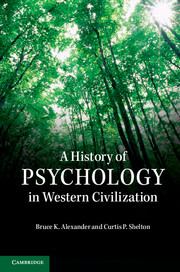Book contents
- Frontmatter
- Dedication
- Contents
- List of figures
- List of tables
- Preface
- Acknowledgements
- 1 Introduction: Two histories of Western psychology
- 2 Rationalism: Plato and the “just” person
- 3 Stoicism: Marcus Aurelius and the sufficient self
- 4 Christianity: St. Augustine and the incomplete soul
- 5 Materialism: Thomas Hobbes and the human machine
- 6 Empiricism: John Locke, David Hume, and experience as reality
- 7 Evolution: Charles Darwin and Homo sapiens as a work in progress
- 8 Medicine: Sigmund Freud and the world of neurotics
- 9 Re-imagining psychology
- Appendix A Plato’s nature of intelligence and other faculties
- Appendix B The search for Aunt Lena
- Index
- References
2 - Rationalism: Plato and the “just” person
Published online by Cambridge University Press: 05 July 2014
- Frontmatter
- Dedication
- Contents
- List of figures
- List of tables
- Preface
- Acknowledgements
- 1 Introduction: Two histories of Western psychology
- 2 Rationalism: Plato and the “just” person
- 3 Stoicism: Marcus Aurelius and the sufficient self
- 4 Christianity: St. Augustine and the incomplete soul
- 5 Materialism: Thomas Hobbes and the human machine
- 6 Empiricism: John Locke, David Hume, and experience as reality
- 7 Evolution: Charles Darwin and Homo sapiens as a work in progress
- 8 Medicine: Sigmund Freud and the world of neurotics
- 9 Re-imagining psychology
- Appendix A Plato’s nature of intelligence and other faculties
- Appendix B The search for Aunt Lena
- Index
- References
Summary
The rationalist perspective on psychology is based on the belief that the most important aspect of human nature is the capacity for reason that sets human beings apart from other animals. Rationalist psychologists must be at least partly right in this belief. No extraterrestrial visitor could study our corner of the universe without finding amazing evidence of human reason and intelligence everywhere, even though it might appear a strangely self-destructive force at times.
The rationalist perspective on psychology is more than just a flattering self-description of the human species. It unfolds to a complete description of human nature that can address just about any question that a present day psychologist might raise, from the source of happiness to the nature of intelligence, to the cause of mental illness and alcoholism, to the origin of values, to the best methods for conducting research. In the broader, philosophical sense of the word, rationalism continues unfolding across the borders of psychology in every direction – to politics, education, science, mathematics, religion, and the ultimate nature of reality. Although the rationalist perspective does not dominate today’s psychology, it was powerfully influential in the psychological thinking of at least two eras – the classical Greco-Roman era and the Enlightenment of early modern Europe – and it remains influential today.
- Type
- Chapter
- Information
- A History of Psychology in Western Civilization , pp. 31 - 97Publisher: Cambridge University PressPrint publication year: 2014

